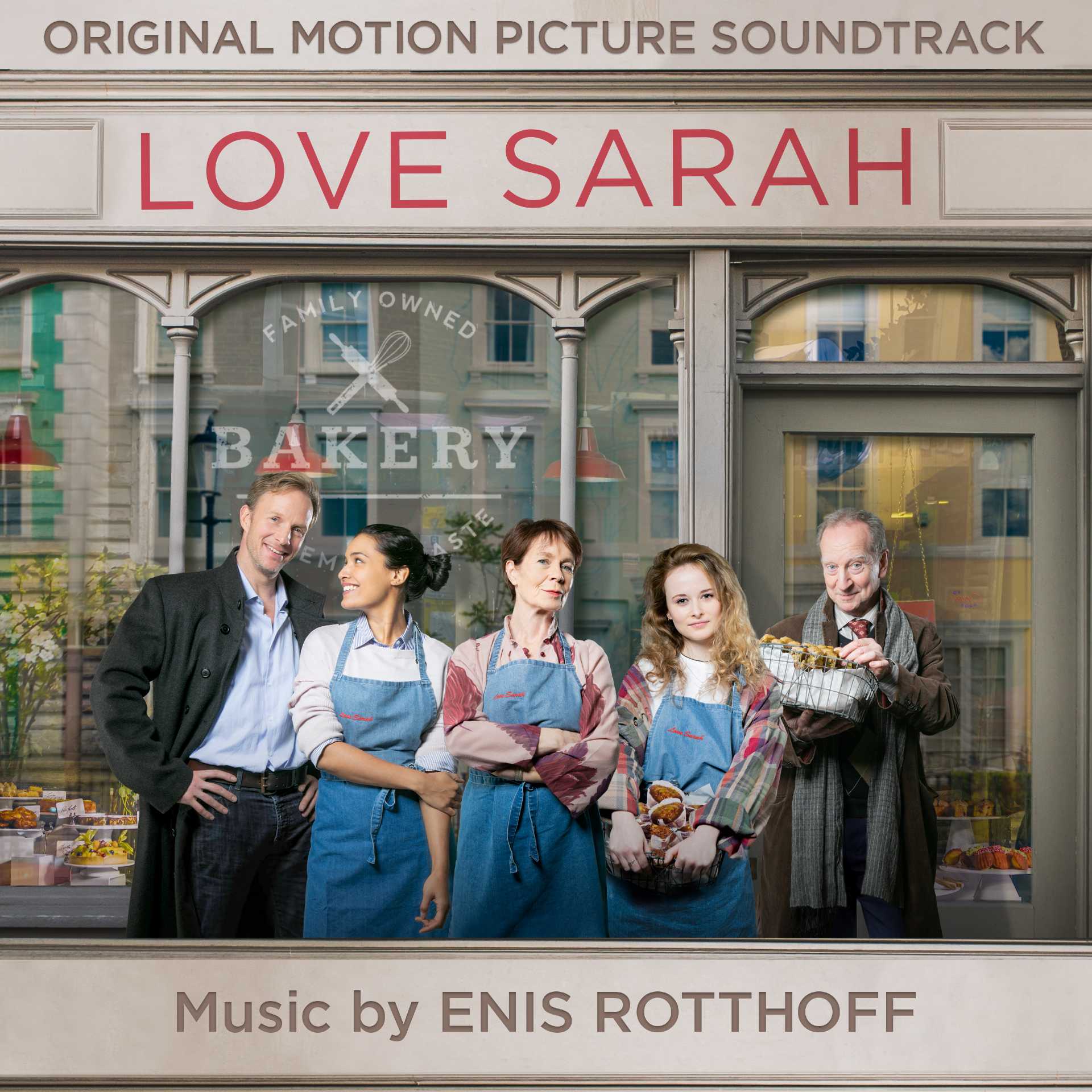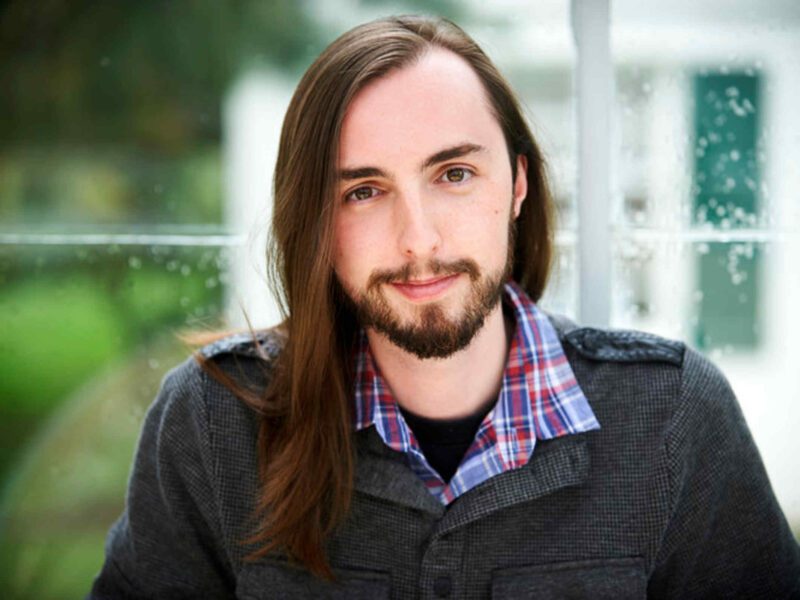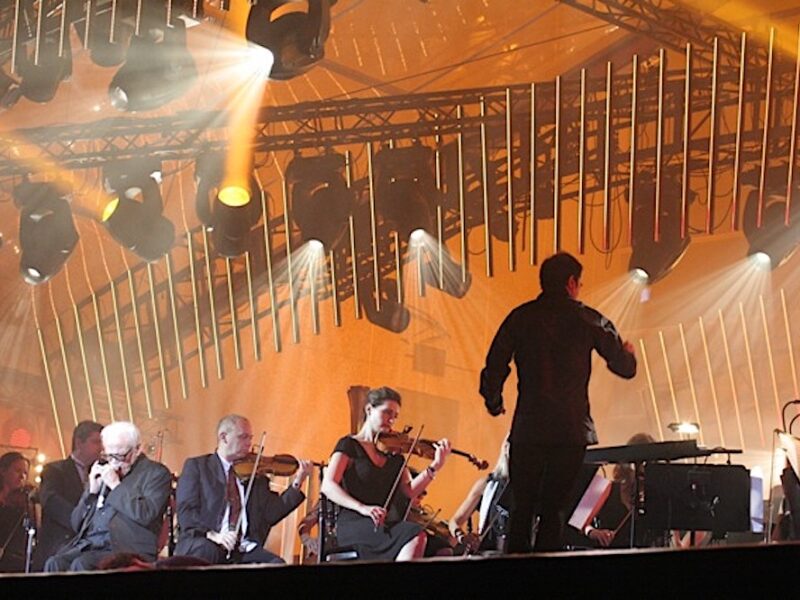
Musical energy: Get to know ‘Love Sarah’ composer Enis Rotthoff
Enis Rotthoff wants to push the boundaries. The film composer has made a name for himself by combining traditional orchestration with cutting edge electronic sounds. He first hit upon this unique style when he earned a scholarship for young composers, and studied under the tutelage of Academy Award-winning composer Jan A.P. Kaczmarek.
Rotthoff continued to refine his vision by studying Film Music at the Film University Babelsberg and Audiovisual Communication at the University of Arts Berlin. He was selected as a Sundance Composers Lab Fellow in 2017 and received the German Music Author’s prize for his work as a film composer in 2018. Since then, Rotthoff has scored dozens of films in the United States and Europe.
Some of Rotthoff’s most recent projects include Jason Lei Howden’s Guns Akimbo, which premiered at the 2019 Toronto International Film Festival and stars Daniel Radcliffe; David Wnendt’s The Sunlit Night, which premiered at the 2019 Sundance Film Festival and stars Gillian Anderson, and Jenny Slate; and the Sundance Grand Jury Prize nominee Wetlands starring Carla Juri. He also scored the drama-comedy Love Sarah, which was written and directed by Eliza Schroder.
Film Daily had the good fortune of talking with Enis Rotthoff about his unique musical approach, his desire to challenge himself, and his concept behind the Love Sarah score. Here’s what he had to say:

Tell us about your history in composing. How did you start your journey?
My journey started in my childhood when I was about ten years old. For me the most exciting thing about films was the music. It kept my mind busy after having watched the films and turned into a passion for film scores. When watching films I would memorize their musical themes.
Then I would try to replay them at the piano and get visual flashbacks from the films while playing the music. My childhood fascination turned into a passion when I was a teenager. I started to improvise on the piano and was journaling my emotions as little piano pieces, which turned into my first compositions. I received a scholarship for young composers that helped me immensely build my musical understanding.
From then on I was looking for opportunities to learn more about film music. I was lucky to become an Assistant to Academy Award-winning composer Jan A.P. Kaczmarek. I then studied film scoring and composed the music to many short films before scoring my first feature film when I was 22 years old.
You studied at the Film University Babelsberg and the University of Arts Berlin. What were the most useful musical lessons you took from these institutions?
At the Film University Babelsberg we had the opportunity to record our compositions for student films with the Filmorchestra Babelsberg several times a year. That helped me tremendously to try out what worked in my compositions and what didn’t. It allowed me to experiment in a way that you can’t afford if you are on a tight budget or schedule on a film score.
At the University of Arts Berlin I took many film classes that shaped my understanding of film. I took screenwriting classes, learned about cinematography and editing and how to communicate with the audience. I am very thankful that I had the opportunity to dig deeply into a broad array of fields which enriches my work and my life all the time.
You studied and worked with Oscar-winning composer Jan A.P. Kaczmarek. Can you tell us about this professional relationship and how it helped shape your own composing style?
It was wonderful to work with Jan and learn from him. He is a great composer and a wonderful person. To be able to be part of these bigger productions and work with fantastic orchestras showed me how I could be able to score such films one day. But what is most meaningful to me has been our relationship both as friends and him as a mentor.
We both quickly realized that we have similar sensibilities. I am from another generation and therefore built on a different musical background. Nevertheless, in orchestral music and the cinematic language of film there are universal elements and musical approaches that are timeless.
Mentors can be a useful thing in the artistic world. How would you recommend people go about finding them?
I think to find the right person you need to be interested in artists and people on a holistic level. Depending on what you are expecting, just don’t expect that a person is there to solve anything for you. Look for people that you can relate to personally and that you would enjoy spending time with.
You could meet your mentor at the school you are studying at or at a panel where the speaker inspired you. It can also start with someone who may not be a composer but understands the field and the challenges as an artist very well. There might be already someone who you have met that you could have a valuable exchange with.
You never know what you can learn from someone and sometimes the lesson you learn pays off many years later. Also, it does not need to pay off. Sometimes we don’t even recognize how things or people shape us. It is not about trying to find someone who gives you advice but more someone you are thankful to spend time with.
You’ve collaborated with some of the finest European orchestras and soloists in the world. How does your approach to collaboration differ from playing music on your own?
While composing with electronics or contemporary instruments, I perform certain instruments myself during the process as the sounds of an electric guitar or a synthesizer really depend on their live performance. Later, when all of the music is done everything gets reevaluated to determine if we need a different guitar player or a new recording from me.
When I present demos of my music to filmmakers and everybody knows that we will be recording many musicians in the end, there is an expectation of some later magic. If you work with outstanding musicians, that magic turns into something more than magic. I already get goosebumps during the recordings as there is so much beauty to be experienced that can’t be put into words.
For a moment, I can enjoy the music for the first time even though the composition is already done in my mind. Musicians that perform your music are the ones that bring your music to life. It’s still a miracle to me how nuanced some musicians can translate feelings through their instrument. And the best musicians add something you would never be able to put into your written score.

You recently composed the scores to the romantic drama The Sunlit Night and the action comedy Guns Akimbo. How much does the genre of a film influence the style and composition of your music?
I really like to dive deeply into the film worlds I am scoring. In the case of The Sunlit Night and Guns Akimbo the musical worlds were almost opposites. In The Sunlit Night I combined a chamber string ensemble with atmospheric electronics. In Guns Akimbo I let my inner teenager create an 80s/90s retro electronic Soundtrack with vintage synthesizers, drum machines and electronic guitars and basses.
The story of the film and the vision of the filmmakers shape my musical direction. This is one thing I truly love about film scoring. By staying open and starting from scratch on every film it always stays interesting and exciting for me. And to start with a blank page means everything is possible.
Do you find it easier to compose music for a particular genre? Is there a genre you want to attempt to score but have not yet gotten the chance?
I love writing for the Orchestra as I just enjoy what live musicians add to the music and the energy of the films. My fascination with electronic music since my childhood has turned into another layer of my musical vocabulary that I had the opportunity to bring out in more and more films. These sides are quite different and sometimes there is a project where you can combine these worlds.
I like to be inspired by music from all over the world. Some projects offer the opportunity to explore new musical cultures. That research can be very enriching. There are so many genres I’d like to keep exploring. It is wonderful if filmmakers take me on a journey for a particular project or the research for a film opens up new genres.
In terms of genres I am interested in films that make humans and their stories more accessible to the audience. Film music can add to the audience’s empathy towards a character or a story immensely. And that’s appealing to me – to tell a wide range of stories and make us feel for everybody.
Your latest film, Love Sarah, is a unique blend of comedy, drama, and romance. What initially drew you to the project?
The director Eliza Schroeder and I had met many years before. When she approached me a decade later if I was interested in scoring her debut feature I was excited to learn more about her film. As I saw the first shots where you can see the making of the tasty desserts, I was sold.
The film itself has a unique blend of comedy, drama and romance and finding the right tone to combine these different genres was a wonderful challenge. I could relate to the beautiful pictures of the film and the heartwarming energy and understood what emotions Eliza was looking for.
Through conversations I learned that she had a clear vision of the emotions in the film and what the music would need to add or support. The scenes are so well directed. In every scene you know where you are emotionally. That clear direction helped me create a score that could encapsulate all these layers while staying truthful to the overall ark.
The score for Love Sarah employs several different instruments. How does the musical progression correlate with the progression of the characters during the film?
The film is framed around the loss of a loved one and how to overcome that pain. That frame is mirrored in the music. The film starts and ends with the main theme. The music starts with an opening theme which combines all characters. In the end of the film the same theme arises again, but this time it is clearer. Whereas in many scores you build towards the end, this final piece in the film is more reduced.
In the beginning of the film the music is energetic and dynamic. In the end of the film, the music is more reflective, full of inner strength and resolution. Both pieces are out of the same ingredients, the latter one is just more refined and reduced which reflects our protagonist’s journey.
Over the course of the film we cope with loss, enjoy the inspiration and realization of a dream, the magic of baking and falling in love. All these different adventures are based on one event: the loss of Sarah. The music is built in a similar way. Every theme for the film is connected to Sarah and her main theme. They are variations in different emotions with their own individuality. They are interconnected like a family.
What would you say sets Love Sarah apart from your previous film scores?
The instrumentation of the film was quite classical. We decided for a chamber string ensemble combined with a harp, flute, celesta, piano with some electronic guitar and bass infusions. Sparsely I added some electronic atmospheres or a custom made tuned drum whenever we needed an ethereal atmosphere.
What made this film special for me was the hopeful and heartwarming attitude of the film combined with the deep felt emotions and good values. Over the course of the film you experience so many emotional states. I had to find a balance between simplicity and complexity, fun and serious feelings while creating a musical sound for the film that keeps everything together.

Do you prefer screening a film before you compose the score or do you like to create without outside influence?
It really depends on the project. I might have early ideas after reading the script or through a conversation with the filmmaker. But once there is an early edit of the film I try to get direct inspiration from the film, the cinematography, the performances of the actors or the pacing of the film. Sometimes the influence comes from unexpected places.
Once I start thinking about a film and the music, I am busy with the score in mind. I start researching or learning about the films’ topic or backstory. That’s my favorite time of the project where I build ideas. But the best inspiration is always the film itself for me.
How closely do you work with the filmmakers? Do you ever have to rework or adjust a musical score based on their feedback?
Most of the time I work very closely with the filmmakers. Composing the themes and pieces is one part of being a film composer. The other part is making adjustments and understanding the vision and ideas of the filmmakers.
We might realize that we need a different tone in a scene, a different beginning or ending, a different tempo or adjustments to newer edits of the film. Interestingly these reworkings can be opportunities as you revisit your work and can use that opportunity to fine-tune elements.
Who are your biggest musical influences?
As I kid every film composer was my hero, especially John Williams, Alan Silvestri, Jerry Goldsmith, James Horner, Ennio Morricone and Henry Mancini. In my teens through my composition classes I got excited about Mozart, Beethoven and Shostakovich while listening to The Beastie Boys, Sublime and Portishead with my friends.
In my twenties I was influenced by Michael Nyman, Philipp Glass, John Corigliano, Bernard Herrmann and John Barry. I also really love genre bending groups like Daft Punk, Justice, Air or Gorillaz.
You’re known for combining orchestral flourishes with cutting edge electronic sounds in your music. Where did the impetus for this unique style come from?
I grew up in Berlin and electronic music and the club scene had been already strong when I was in my early teens. Going out to clubs and experiencing electronic music in concerts had an influence on me. In a way it was weird for me to focus on orchestral music while growing up in one of the hubs for electronic music – although I later learned what an amazing orchestral world Berlin has to offer as well.
The first films I scored were more orchestral with additions of exotic instruments or some electronic sounds. Years later I was offered more and more films where I could live out that other side of me going consciously for synthesizers or soundscapes. Now after having built different ways of thinking and composing music I find this a gift to float between these worlds and create a unique blend based on the film.
What’s your mission as a composer? Name the most important thing you want viewers to experience when watching your projects.
I am looking for a sense of flow that I can only put into words through my music. There are these cinematic moments where the music and all other elements of the film create an energy or magic that is exciting and satisfying. It does not have to be a happy moment. It can be any emotional state. The perfect orchestration of a scene with its music almost feels effortless. And that’s inspiring and something I aspire to.

What has been your greatest success as a composer?
Realizing my childhood dream of becoming a film composer.
How about your biggest failure? What did you learn?
To only work with people you want to work with.
Can you tell us about any of your upcoming projects?
I am working on a drama where I am using electronic synthesizers and drum machines. So it is very different to Love Sarah.
What advice do you have for aspiring composers?
Don’t put pressure on yourself to find your own voice as a composer immediately. Find it on your journey.
What is your favorite film score of all time?
Schindler’s List by John Williams & The Godfather by Nino Rota.
As a kid I would have said Back to the Future by Alan Silvestri.







